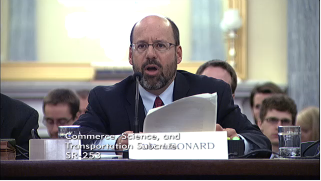- Blog
- Sustainable Economic Systems
- Genetically engineered salmon grilled at Senate Commerce hearing
Genetically engineered salmon grilled at Senate Commerce hearing

Donate Now!
Your contribution will benefit Friends of the Earth.
Stay Informed
Thanks for your interest in Friends of the Earth. You can find information about us and get in touch the following ways:
Yesterday morning, the Senate Commerce’s Subcommittee on Oceans, Atmosphere, Fisheries, and Coast Guard held a hearing on the environmental risks posed by genetically engineered salmon (archived webcast of the hearing available). As you may remember, the Food and Drug Administration announced in August 2010 that it was close to finalizing its approval of a genetically engineered salmon produced by AquaBounty Technologies – which would make it the first-ever generically engineered animal to be approved for human consumption. Since then, we’ve been submitting comments, writing letters, and traveling across Canada to raise awareness on the environmental risks of genetically engineered salmon.
Senator Begich (D- Alaska), chairman of the subcommittee, started things off by expressing concern that the FDA does not have the needed expertise to actually assess the full range of risks these fish pose to our marine ecosystems. The only prudent way forward, Senator Begich said, would be to assume the genetically engineered fish will escape confinement since we know from experience with aquaculture that fish escape all the time. Senator Snowe (R- Maine), ranking member of the subcommittee, explain how the laws used by the FDA to regulate GE animals – laws intended to approve new animal drugs – are outdated and inadequate in dealing with the many risks posed by this fast-growing transgenic fish.
The first testimony came from Dr. Rob Stotish, president and CEO of AquaBounty. Unsurprisingly, he told the committee that his company’s fish are not only safe for the environment they are actually better than fish from traditional aquaculture operations because AquaBounty’s fish could be raised close to city centers and cut down on the pollution from shipping fish around the globe.
The other three witnesses were critical of the FDA and its plan to approve genetically engineered salmon without proper environmental review. Dr. John Epifanio, a fish conservation geneticist with the Illinois Natural History Survey and University of Illinois said how proper risk assessment must be done now since the genetically engineered salmon will set a precedent for all future genetically engineered animals. Even subtle genetic changes, Dr. Epifanio explained, could impact the behavior and survivability of a fish and no matter how good a containment system AquaBounty may build there will always be flaws in the plan and fish will escape. He urged the FDA to consult other agencies, such as the Fish & Wildlife Service, in conducting a robust and formal risk assessment and in actively monitoring the impacts of the fish if actually approved.
Next up was Dr. George Leonard, director of the Ocean Conservancy’s aquaculture program, and a coalition partner in our campaign. Dr. Leonard explained how the FDA is not answering a number of questions on environmental risk and it is not even asking the right questions. Instead of accepting AquaBounty’s claims that its fish are all sterile and won’t escape into the wild the FDA should be demanding strong data to support those claims (although, even the FDA admits only 95 percent of the genetically engineered salmon will in fact be sterile when working at a commercial scale).
Last to testify was Paul Greenberg, journalist and author of the wonderful book Four Fish. Mr. Greenberg explained how he has seen fisheries and fish farms around the world and had to conclude that this genetically engineered fish is just “a bad idea.” AquaBounty’s salmon, he explained, do not bring any benefits to society or our environment and is simply an “outdated fish” and an outdated technology. Rather, sustainable fisheries management and ecological restoration is how we will be able to provide people with plentiful and nutritious seafood.
The Q&A section was quite heated – with most of the questions being posed directly to Dr. Stotish of AquaBounty. Why, for example, did AquaBounty recently receive a half-million dollar grant from the USDA in order to perfect its sterilization techniques if it is telling the FDA its fish are already sterile? Paul Greenberg accused AquaBounty of trying to shift the responsibility of guaranteeing safety in its system from the company to the FDA and the public at a time when we simply cannot afford to create new risks to our already struggling and endangered fisheries.
The hearing was held to discuss Senator Begich’s recently introduced bill S. 1717, the Prevention of Escapement of Genetically Altered Salmon in the United States Act (most excellently known as the PEGASUS Act). The Senator has also introduced legislation that would prevent the FDA from approving genetically engineered salmon and requiring that genetically engineered salmon be labeled if approved – both of which have companion bills in the House (but neither of which, unfortunately, are named after winged mythical creatures).
Visit our campaign website to learn more about what you can do to help stop the approval of genetically engineered salmon or the broader coalition website for more information on the full range of environmental, public health, economic, and regulatory problems with the current FDA GE animal approval process.
